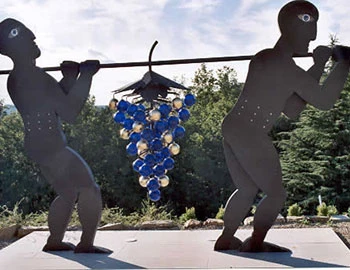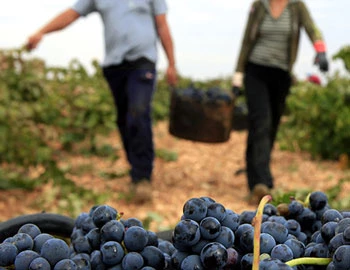Roland und Karin Lenz
In 1994, while Roland Lenz was still studying oenology, he and his wife Karin were able to acquire eight hectares of vines on the Iselisberg. It was a unique opportunity that they seized, even though they were toying with the idea of setting up their own business abroad, far from Switzerland. They actually did so later, but that's another story…
It is only in the last two decades that the Canton of Thurgau has really come to the attention of wine lovers as a wine-growing area. Its apple orchards and the apple juice (must) pressed from the picked fruit have always been popular, inevitably earning the canton its nickname of «Must India». Viticulture, however, has existed in this region for centuries.
White wines from Roland und Karin Lenz
Red wines from Roland und Karin Lenz
from Roland und Karin Lenz
The canton's largest wine-growing area is located in the Lower Thur Valley, extending from west to east, from Warth-Weiningen near the famous Ittingen Charterhouse to the cantonal border with Zurich near Ossingen. At its heart is the Iselisberg - a magnificent and ideally south-facing slope, a moraine left behind at the end of the Ice Age by the retreating Rhine glacier. (Source: Stein und Wein, Regional Magazine 2)
Roland and Karin Lenz own the majority of the plots on this sun-drenched slope, a total of around 24 hectares. These benefit from an outstanding microclimate and ideal soil conditions. The mineral-rich, gravelly-clayey moraine soils (some with sand) are suitable for many different grape varieties. Sunshine received on this slope is optimal. It is also frequently very windy, which counteracts fungal diseases, with precipitation lower than in other areas of Switzerland. The difference in altitude between the lowest and the highest vines is around 120 metres. All these factors have resulted in 34 sorts of grapes now being cultivated, three quarters of which are new, fungus-resistant varieties, so-called PIWI vines, which Roland Lenz believes are the future of organic winegrowing.
Roland Lenz turned to organic viticulture after suffering from an allergy triggered by pesticides. That first attempt at transforming the growing process failed after a relatively short time. A few years later, his second attempt succeeded thanks to greater understanding of the prevailing climatic and soil conditions. The vineyard is certified to Bio Suisse Delinat and Knospe guidelines, which are stricter than the general Swiss or EU directives. But simply adhering to guidelines is not Roland Lenz's cup of tea. His aim, together with his wife Karin and their team, is to make a significant contribution to long-term, ecologically sustainable wine production in the broadest sense. This concept is intended to guarantee nothing less than the health of humans, flora, fauna and the soil alike, enabling economically viable working methods, while promoting social responsibility among every single individual in our society.
In the Lenz vineyards, the focus is increasingly on the new varieties (PIWI). In 2020 and 2021, they will add around 7 hectares in Stammheim (further north, in Canton Zurich), which are planted with these vine species. These new, robust grape varieties can be cultivated more cost-effectively and, above all, without the protection of copper-based fungicides, thereby eliminating a blemish that is painfully inherent in organic agriculture. Only plant fortifying agents such as tree bark extract and aqueous extracts from nettles, wallwort, valerian or marigolds are used. It should be mentioned, however, that thanks to the Lenz family's love of experimentation, these biodynamic methods (Demeter certification is planned for 2021) are also used to treat their traditional grape varieties such as Pinot Noir and Sauvignon Blanc, as well as the «exotic» ones such as Grüner Veltliner, Viognier, Chenin Blanc, Cabernet Franc or Malbec.
variety diversity mitigates disease pressures to which monocultures are more exposed. As a logical consequence, biodiversity in general is being extended steadily. Incrementally, areas of up to 10 ares are being returned to nature as compensation or biodiversity spaces between the rows of vines, currently over 12% of the cultivated footprint! In those areas, native bushes, shrubs and fruit trees are then planted, with shelters for animals, reptiles and insects provided, or they are left as natural meadows. All these measures promote and preserve flora and fauna diversity in the vineyards. In such a diverse habitat, beneficial insects and pests maintain mutual equilibrium. A natural biocoenosis is created in which plants, insects and animals harmonize optimally under the care of the winegrower.
Roland Lenz is convinced that the future belongs to the new grape varieties. Consequently, in 2017, he launched his own certified organic grapevine nursery, which will produce Solaris, Souvignier Gris, Léon Millot, Cabernet Jura and Cabernet Blanc, among others. In 2018, in collaboration with Valentin Blattner, a renowned Swiss vine grower, the «Vineyard of the Future» was added, incorporating 100 as yet unnamed varieties that one day will be micro-vinified for testing purposes. Also included is an experiment with a mixed array of plots in which different grape varieties are planted as a mixed set. Expectations are high!
It goes without saying that biological guidelines are also observed in the cellar. Healthy grapes and prompt processing are absolute essentials. Only two additives are employed: bentonite clay and a little sulphite to stabilise the wines, thus making all Lenz wines vegan. Care is also taken in the context of packaging, where lightweight glass, unprinted outer boxes and bio-sourced Diam corks are used. Given the plastic and aluminium materials needed, the Lenz family does not consider screw caps to be sufficiently ecologically sustainable. They have also made special efforts with regard to energy consumption. In 2015, Karin and Roland Lenz's facility became the first energy-autonomous winery worldwide! All buildings are heated by geothermal energy, electricity is generated by photovoltaics and managed independently by the estate using battery storage.
Lenz family has worked particularly closely with Baur au Lac Vins for many years. Over time and in conjunction with our Purchasing Manager Mario Aschwanden, various exclusive wines have been created that are bottled under the label «Cuvée 1844», referring to the year when the Baur-au-Lac was established. These are primarily pure wines produced from traditional grapes such as Pinot Noir or «exotic» varieties that are unusual for Switzerland, such as Chenin Blanc or Grüner Veltliner. The “Cuvée Blanc” unifies traditional and new varieties. Now that Karin and Roland Lenz’s business has been nominated ‘Winery of the Year’ by Baur au Lac Vins, two new wines have been added to the range whose names further express that fine collaboration: the “Cuvées Ballenz” in red and white versions, with a large proportion of such new grape varieties.
Roland and Karin Lenz are proving that even in our latitudes, a large vineyard - by Swiss standards - can be successfully managed in compliance with organic guidelines (by the way: wanderlust ultimately led the pair to Chile, where they also run an organic winery). Today, they are both Swiss pioneers for organic winegrowing and an exemplary business operation. Their wines meet the highest standards of quality. In addition to outstanding taste refinement, these offer clear and valuable added value through the quality of the production process. For those efforts, Roland and Karin Lenz have been acclaimed twice - in 2015 and 2018 – with the «Swiss Organic Winemaker of the Year» award. Their innovative spirit, passion and conviction continue to drive them forward. Roland Lenz's next milestone: to produce “his” new grape variety, the Lenz-Thurgau!
Producer

Weingut Rings
Weingut Rings, part of the Palatinate’s vineyard premier league, lies embedded in the sun-drenched Palatinate, right in the middle of the Freinsheim winegrowing district. For more than a decade, the new generation of the Rings family has been passionately concentrating on the ecological production of high quality dry wines. The hallmarks of Weingut Rings are well-balanced, dense wines with pronounced character and great cellar potential.

Il Molino di Grace
Frank Grace acquired this estate in 1995 after holidaying in Tuscany with his wife and having fallen for the charm of this idyllic region.

Bodegas Campos Reales
The landscape of Meseta Central stretches out endlessly to include La Mancha, the land of Don Quixote and Sancho Panza, and also Spain's largest wine region.













